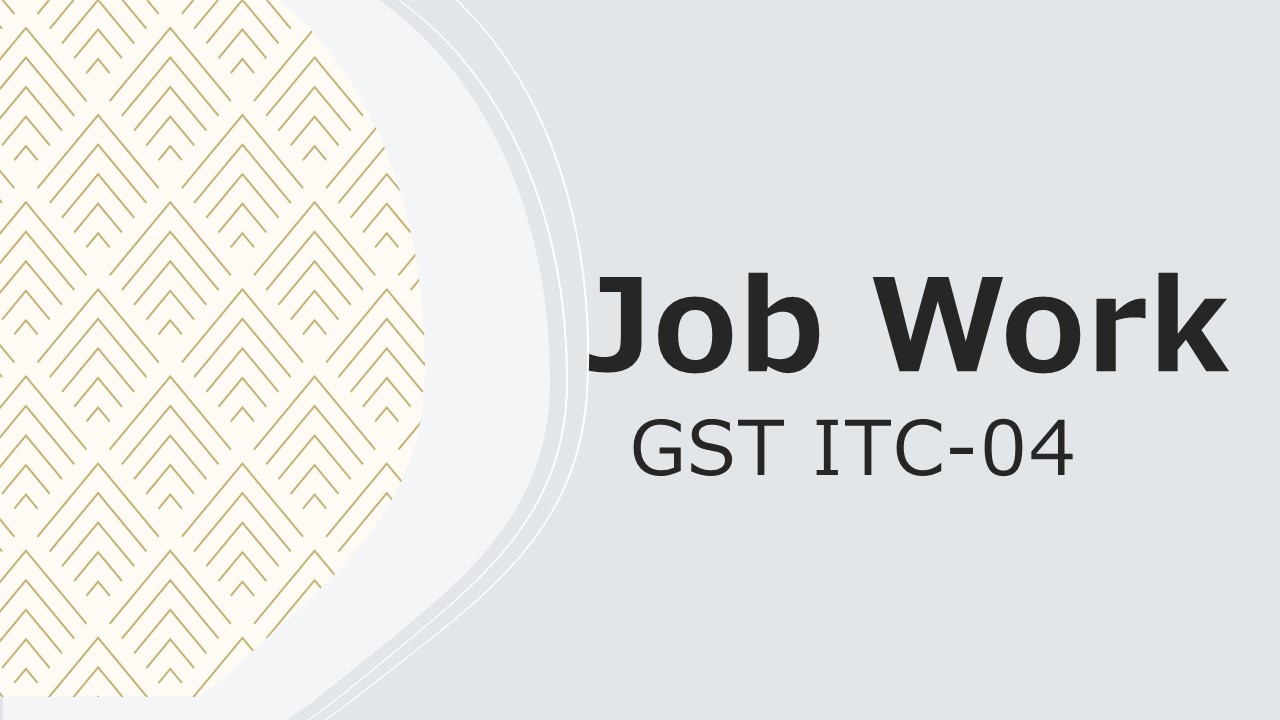JOB WORK UNDER GST (GST ITC-04)
Job Work Under GST is a significant segment in the Indian manufacturing industry. It involves the processing or working on goods supplied by the principal manufacturer. Under GST, special provisions facilitate the seamless movement and processing of goods for job work, ensuring compliance and benefiting both the principal and the Job Worker.
Job Work under GST means any treatment or Process undertaken by a person on goods belonging to another REGISTERED PERSON (Section 2(68) of CGST Act, 2017)
Principal is the Registered Person who send his Goods i.e. Inputs/ Capital Goods to Other person for Job Work
(Input Includes Intermediate goods arising from any treatment or process carried out on the Inputs by the Principal or the Job Worker.)
- Sending Goods for Job Work (Section 143 CGST Act, 2017)
- Time Limit for Supply/ Receive Back after Job Work
- Waste and Scrap Management in Job Work
- Direct Clearance from Job Worker Premise
- Deemed Supply of Inputs and Capital Goods in Job Work
- Input Tax Credit (ITC) in case of Job Work (Section 19 of CGST Act, 2017)
- Intimation/ Returns
Sending Goods for Job Work (Section 143 CGST Act, 2017)
Principal may send Input Tax Credit (ITC) availed Goods(Inputs as well as Capital Goods) to Job Worker for Job Work and from there subsequently send to another Job Worker and likewise without paying GST under cover of Job Work Challan which is defined in Rule 45 of CGST Rules, 2017 and this is a similar document of Delivery Challan which is specified in the Rule 55 of CGST Rules, 2017
Input Includes Intermediate goods arising from any treatment or process carried out on the Inputs by the Principal or the Job Worker.
ITC availed on Goods remain as it is in respect of Goods sent for job work (Section 19 of CGST Act, 2017)
Time Limit for Supply/ Receive Back after Job Work
Principal can send Inputs or Capital Goods to a Job Worker without paying tax, provided certain conditions are met. The goods can be sent to multiple Job Workers in sequence. The principal must:
- Bring back the Inputs or Capital Goods (Excluding Moulds, Dies, Jigs, Fixtures, and Tools) to any of their business locations within one year for inputs and three years for capital goods, without paying tax.
If the inputs or capital goods are sent directly to a Job Worker from the Supplier, the period of one year for inputs and three years for capital goods will be counted from the date of receipt by the Job Worker. In rest of the cases Goods sent date shall be considered for the purpose of computing One year or three year as the case may be. - Supply the Inputs or Capital Goods (Excluding Moulds, Dies, Jigs, Fixtures, and Tools) from the premise of Job Worker within one year for inputs and three years for Capital Goods, either by paying tax for domestic supply or With/Without tax for export.
Extension of Time Limit The Commissioner may extend the time limit for return or supply of inputs or capital goods on sufficient cause being shown for 1 year and 2 years for Inputs and Capital Goods respectively.
It is important to note that In case of Capital Goods, the time limits for bringing back or supplying goods do not apply to Moulds, Dies, Tools, Jigs, and Fixtures.
Waste and Scrap Management in Job Work
- Job Worker is Registered
If Job Worker is registered under GST, any Waste or Scrap generated during the Job Work Process can be legally sold by the job worker directly from his place of business.
For instance, Principal operate a furniture manufacturing business and send wooden planks to a Registered Job Worker for crafting. During the crafting process, some wood waste is generated. The Registered Job Worker can legally sell this wood waste on behalf of Principal’s Invoice, issuing an invoice and paying the requisite GST.
It is important to note that the provisions related to the time of supply, value of supply, and place of supply must be considered from the principal’s perspective.
- Job Worker is Unregistered
In the case where your Job Worker is not registered under GST, any waste or scrap produced during the job work should be returned to the principal.
Principal can include the processed goods along with the waste and scrap when he receive them back from the job worker. Then, he issue his own invoice and pay the applicable GST.
It’s essential for principals to maintain accurate records of the clearance of waste and scrap from the job worker’s premises.
Direct Clearance from Job Worker Premise
If the Job Worker is registered, the principal can clear directly from the premise of Job worker, regardless of whether the Job Worker is in the same state as the principal or not.
However, if the Job Worker is unregistered, there are two situations to consider:
- If the Job Worker is in the same state as the principal, the principal can clear directly from the premise of Job Worker only if he declare the job worker’s premise as his additional place of business in the GST Registration Certificate. Otherwise, he cannot clear directly.
- If the Job Worker is in a different state from the principal, the principal cannot clear processed goods directly from the job worker’s premise. Instead, they must first bring the processed goods to their own premise before supplying them to their Customer.
Deemed Supply of Inputs and Capital Goods in Job Work
If the Inputs or Capital goods sent for job work are not returned to the principal within the specified time limits, or if they are not supplied from the premise of Job Worker as per the prescribed conditions, it will be deemed that the principal has supplied these Inputs or Capital Goods to the Job Worker on the day they were originally dispatched. These time limits are one year for inputs and three years for capital goods.
If inputs or capital goods are sent directly to a job worker, the one-year period for inputs and three-year period for capital goods start from the date of receipt by the job worker.
For Example – Company A, based in Karnataka, manufactures specialized machinery parts. They send raw materials worth ₹1,50,000 to Company B, an unregistered job worker located in Maharashtra, for processing into finished parts. The materials are dispatched to Company B on January 1, 2023.
- Scenario 1: Non-Return of Processed Goods within One Year
By January 1, 2024, Company B fails to return the processed goods to Company A. As per regulations:
A. Issue an Invoice: In January 2024, Company A issues an invoice to Company B for the processed goods, reflecting the initial dispatch date of January 1, 2023.
B. Declare in Your Monthly Return: In the same month, Company A includes the details of the goods and the issued invoice in their monthly tax return for January 2024.
C. Job Worker’s Credit: Even though the invoice is from January 2024, Company B can claim tax credit for it, offsetting the tax amount mentioned in the invoice against his own tax liability.
- Scenario 2: Return of Processed Goods within One Year
Alternatively, if Company B successfully returns the processed goods to Company A by January 1, 2023
No further actions are required, and no tax implications arise as Company A received the processed goods within the specified one-year timeframe.
Input Tax Credit (ITC) in case of Job Work (Section 19 of CGST Act, 2017)
Inputs/ Capital Goods sent by Principal – In this case ITC availed on Inputs/ Capital goods will remain as it is, Input tax Credit availed will remain Unaffected.
Input/ Capital Goods sent directly to Job worker – In case If Inputs/ Capital Goods sent directly from the Place of business of the Supplier then In that case Principal entitled to Input tax Credit Provided He has to make Job work challan In respect of Goods sent directly.
Goods not brought back or not Supplied – If Goods are not brought back or not directly supplied from the place of business of Job worker within time frame as defined in Section 143 of CGST Act, 2017 Then Deemed Such Inputs had been supplied on the day the said Inputs were Sent out for job work.
Principal shall issue Tax Invoice and declared in GSTR1 and Pay tax with Interest accordingly.
Intimation/ Returns
The responsibility for maintaining accurate records of inputs and Capital Goods rests with the principal. The requirement for disclosing these provisions is outlined in the Provisions Intimation i.e. GST ITC-04 specified under Section 143, as indicated in Rule 45(3) of the CGST Rules 2017.
Form GST ITC-04 holds significant importance for principals engaged in sending inputs or capital goods to their Job Worker. This form necessitates the meticulous detailing of goods dispatched for job work and the subsequent receipt of goods back from the job worker.
According to GST regulations, the principal is obligated to file Form GST ITC-04 within 25 days from the conclusion of the specified period.
The “specified period” varies based on the principal’s aggregate turnover during the preceding financial year. For principals exceeding an aggregate turnover of ₹5 crore, the specified period spans two consecutive six-month intervals: April to September and October to March. This effectively means that such principals must file their returns semi-annually, with due dates falling on the 25th of October and the 25th of April.
Conversely, if a principal’s turnover does not exceed ₹5 crore, the filing requirement shifts to an annual basis, with the deadline set for the 25th of April.
| Principal’s Turnover | Filing Frequency | Due Date | Name of Form |
| > ₹5 crore | Half-Yearly (April to Sept) | 25th October | GST ITC-04 |
| Half-Yearly (Oct to March) | 25th April | GST ITC-04 | |
| ≤ ₹5 crore | Yearly | 25th April | GST ITC-04 |
For any further queries or assistance regarding the Job Work, feel free to contact us at [Taxationteam@gmail.com] We’re here to help!

